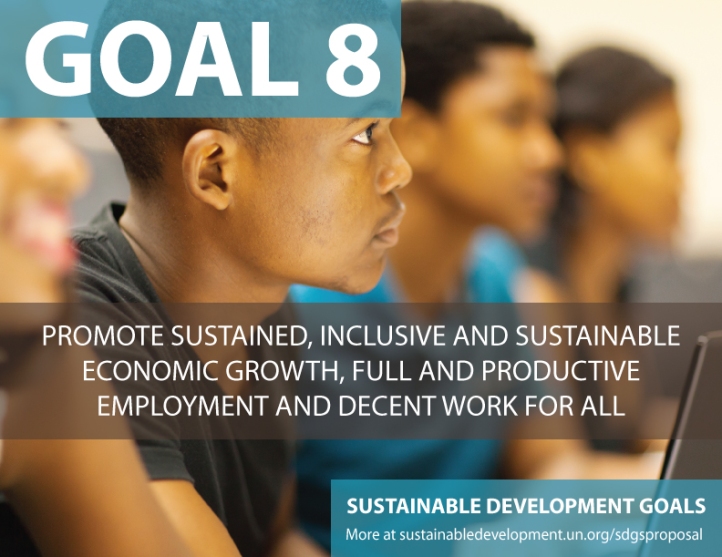“Promote inclusive and sustainable economic growth, employment and decent work for all”
Originally published on 15 September 2015. We are almost half-way through the 17 Sustainable Development Goals and our 17 articles on the way to New York. Today we assess the SDG8: “Promote inclusive and sustainable economic growth, employment and decent work for all”.
Yes, “economic growth” is now a goal. This is a welcome recognition by the UN and its members that social inclusion – the key focus of the still current Millennium Development Goals – and environmental protection cannot happen without economic growth and decent jobs.
SDG8 is also a clear sign that the SDGs exist for developed countries as well. Unemployment for instance is higher in countries like Spain (22.2%), Italy (12.0%) or France (10.4%) than in Peru (6.5%), India (4.9%), or Malaysia (3.1%).
It is finally a call to action to business, the main engine for growth and for job creation.
Goal 8 is one of the goals with more targets: 12!
- Sustain per capita economic growth in accordance with national circumstances and, in particular, at least 7 per cent gross domestic product growth per annum in the least developed countries
- Achieve higher levels of economic productivity through diversification, technological upgrading and innovation, including through a focus on high-value added and labour-intensive sectors
- Promote development-oriented policies that support productive activities, decent job creation, entrepreneurship, creativity and innovation, and encourage the formalization and growth of micro-, small- and medium-sized enterprises, including through access to financial services
- Improve progressively, through 2030, global resource efficiencyin consumption and production and endeavour to decouple economic growth from environmental degradation, in accordance with the 10-year framework of programmes on sustainable consumption and production, with developed countries taking the lead
- By 2030, achieve full and productive employment and decent work for all women and men, including for young people and persons with disabilities, and equal pay for work of equal value
- By 2020, substantially reduce the proportion of youth not in employment, education or training
- Take immediate and effective measures to eradicate forced labour, end modern slavery and human trafficking and secure the prohibition and elimination of the worst forms of child labour, including recruitment and use of child soldiers, and by 2025 end child labourin all its forms
- Protect labourrights and promote safe and secure working environments for all workers, including migrant workers, in particular women migrants, and those in precarious employment
- By 2030, devise and implement policies to promote sustainable tourismthat creates jobs and promotes local culture and products
- Strengthen the capacity of domestic financial institutions to encourage and expand access to banking, insurance and financial services for all
- Increase Aid for Trade support for developing countries, in particular least developed countries, including through the Enhanced Integrated Framework for Trade-Related Technical Assistance to Least Developed Countries
- By 2020, develop and operationalize a global strategy for youth employment and implement the Global Jobs Pact of the International Labour Organization
It is interesting to note the inclusion of entrepreneurs and micro+SMES the third target above. Most of the private sector currently making the noise and speaking at the various events in New York are large and in some case admirable companies, but 90% of the new jobs globally are created by entrpreneurs and new businesses.
What can business do to support Economic growth, employment and decent work for all?
Firstly and quite simply, business should do its job: grow, create and maintain jobs. This is what businesses do best and should keep doing. In a better way though:
- By increasing productivity – even with the risk of creating more immediate unemployment;
- By innovating, supporting job creation, entrepreneurship, creativity and innovation;
- By encouraging micro-, small- and medium-sized companies egbuy from them!
- By improving resource efficiency in consumption and production. Think ofcircular economy, or more basically, that pollution = inneficiency
- By promoting decent work for all and, more controversially, “equal pay for work of equal value”
- By hiring and training young people, suffering most from unemployment in many countries
- By basically respecting human rights internally and across the suplly-chain
- By providing safe and secure working environments
In order to assess, manage and communicate all environmental and social impacts, there are tools such as:
- Life Cycle and Footprint standards:ISO 14044 (Life Cycle Assessment), ISO 14067 (Carbon Footprint), ISO 14046 (Water Footprint)
- Management systems standards:ISO 14001 (Environmental Management Systems btw the 2015 version has just been approved and today published), OHSAS 18001 (Occupational Health and Safety and to become ISO 45001), SA 8000 (Social Accountability), Energy (ISO 50001)
- Report using theGlobal Reporting Guidelines GRI G4 (see G4-EC1, G4-EC8, but also the ones related to energy and materials) and the CDP questionnaire.
That is all for today. Tomorrow we will demand a lot of capital with the probably most expensive Goal, SDG9: “Build resilient infrastructure, promote sustainable industrialization and foster innovation.”
Marcio Viegas is the entrepreneurial founder and managing director at SUST4IN.
Missed our previous articles? Check them here:
- SDG1 (End Poverty),
- SDG2 (End Hunger),
- SDG3 (Health & Well Being),
- SDG4 (Education),
- SDG5 (Gender Equality and Women)
- SDG6 (Water and Sanitation)
- SDG7 (Energy for All)
Celebrate the Sustainable Development Goals with us during the Climate Week NYC. Click on the picture below for more info.


